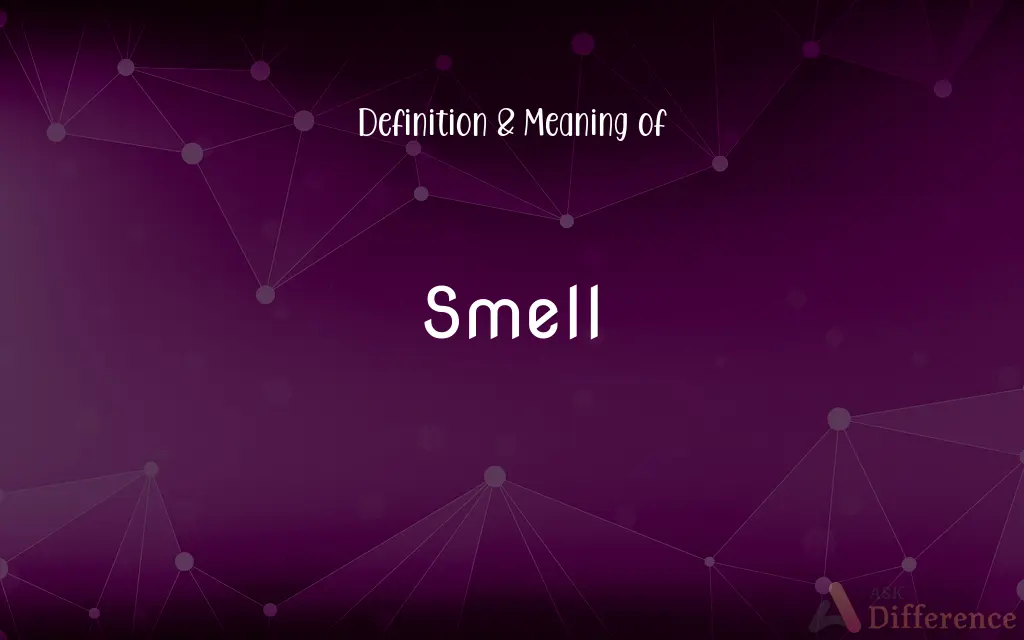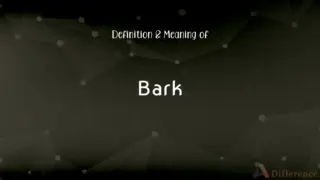Smell Definition and Meaning
By Tayyaba Rehman & Urooj Arif — Published on June 17, 2024
Smell refers to perceive or detect the odor of something through the nose. e.g., She could smell the fresh coffee from the kitchen.

Table of Contents
Smell Definitions
To use the nose to identify or detect something.
He smelled the milk to check if it was fresh.
To have a suspicion or hint of something; to sense.
I smell trouble ahead for the project.
To suggest or show signs of; to hint at.
This situation smells like a scam.
To have or produce an unpleasant odor.
The fridge started to smell because it was unplugged.
The sense, located in the nasal cavities of mammals and relying on the olfactory nerves, by which molecules borne in a fluid such as air can be perceived; the olfactory sense.
A similar sense in other animals, as insects' ability to perceive air-borne molecules with their antennae.
The act or an instance of smelling
Got a smell of the pie.
A quality of something that is perceived by the sense of smell; an odor
The smell of a barn.
A distinctive enveloping or characterizing quality; an aura or trace
The smell of success.
To perceive (an odor) by the sense of smell.
To perceive or detect (something) by a chemosensory organ, such as an antenna.
To inhale the air near (something); sniff
Smiled as she smelled the rose.
To detect or discover, as by intuition or inference
We smelled trouble ahead. The committee tried to smell out corruption in law enforcement.
To use the sense of smell.
To sniff
The dog was smelling around the bed.
To have or emit an odor
"The breeze smelled exactly like Vouvray—flowery, with a hint of mothballs underneath" (Anne Tyler).
To have or emit an unpleasant odor; stink
This closet smells.
To be suggestive; have a touch of something
A remark that smells of sanctimony.
To appear to be dishonest or corrupt
The political situation is starting to smell.
A sensation, pleasant or unpleasant, detected by inhaling air (or, the case of water-breathing animals, water) carrying airborne molecules of a substance.
I love the smell of fresh bread.
(physiology) The sense that detects odours.
(transitive) To sense a smell or smells.
I can smell fresh bread.
Smell the milk and tell me whether it's gone off.
Followed by like or of if descriptive: to have a particular smell, whether good or bad.
The roses smell lovely.
Her feet smell of cheese.
The drunkard smelt like a brewery.
To smell bad; to stink.
Ew, this stuff smells.
To have a particular tincture or smack of any quality; to savour.
A report smells of calumny.
To detect or perceive; often with out.
(obsolete) To give heed to.
(transitive) To smell of; to have a smell of
To perceive by the olfactory nerves, or organs of smell; to have a sensation of, excited through the nasal organs when affected by the appropriate materials or qualities; to obtain the scent of; as, to smell a rose; to smell perfumes.
To detect or perceive, as if by the sense of smell; to scent out; - often with out.
Can you smell him out by that?
To give heed to.
From that time forward I began to smellthe Word of God, and forsook the school doctors.
To affect the olfactory nerves; to have an odor or scent; - often followed by of; as, to smell of smoke, or of musk.
To have a particular tincture or smack of any quality; to savor; as, a report smells of calumny.
Praises in an enemy are superfluous, or smell of craft.
To exercise the sense of smell.
To exercise sagacity.
The sense or faculty by which certain qualities of bodies are perceived through the instrumentally of the olfactory nerves. See Sense.
The quality of any thing or substance, or emanation therefrom, which affects the olfactory organs; odor; scent; fragrance; perfume; as, the smell of mint.
Breathing the smell of field and grove.
That which, above all others, yields the sweetest smell in the air, is the violent.
The sensation that results when olfactory receptors in the nose are stimulated by particular chemicals in gaseous form;
She loved the smell of roses
Any property detected by the olfactory system
The general atmosphere of a place or situation and the effect that it has on people;
The feel of the city excited him
A clergyman improved the tone of the meeting
It had the smell of treason
The faculty of smell
The act of perceiving the odor of something
Inhale the odor of; perceive by the olfactory sense
Emit an odor;
The soup smells good
Smell bad;
He rarely washes, and he smells
To detect or perceive odors through the olfactory senses.
Dogs can smell much better than humans.
To emit an odor.
The room smelled like fresh paint.
To have a particular quality or suggestion of something.
The plan smells of desperation.
To be or become aware of something by the sense of smell.
She smelled the roses in the garden.
To give off an odor indicating the presence of something.
The kitchen smelled of garlic and onions.
To test or investigate by the sense of smell.
The detective smelled the container for any chemical residue.
Smell Snonyms
Sniff
To draw air through the nose to detect a smell.
The dog sniffed at the ground, searching for clues.
Inhale
To breathe in; often used in the context of smelling.
She inhaled deeply to enjoy the fragrance of the flowers.
Nose
To detect or search out by smell.
The hound nosed its way to the hidden drugs.
Scent
To detect or emit a particular smell.
The hunter scented the deer from afar.
Whiff
To get a brief or faint smell of something.
He caught a whiff of her perfume as she passed by.
Detect
To discover or identify the presence of something, often by smell.
The smoke alarm can detect even a small amount of smoke.
Snuffle
To breathe noisily through the nose, especially when smelling something.
The rabbit snuffled around the garden, smelling the vegetables.
Odorize
To give an odor to; used less commonly in the context of smelling.
Certain plants odorize the air with their fragrant blooms.
Perceive
To become aware of something through the senses, including smell.
She could perceive the subtle scent of his cologne.
Reek
To give off a strong, unpleasant odor.
The alley reeked of trash and decay.
Smell Idioms & Phrases
Wake up and smell the coffee
To become aware of the realities of a situation.
You need to wake up and smell the coffee; the project is failing.
Smell a rat
To suspect something is wrong.
He smelled a rat when the deal seemed too good to be true.
Smell Example Sentences
Can you smell the smoke? There might be a fire nearby.
She loves to smell the flowers in spring.
You can smell the rain coming with the wind.
I can't smell anything; I think I have a cold.
She could smell the sea as they approached the coast.
Common Curiosities
Why is it called "smell"?
The word "smell" comes from the Old English "smellan" or "smælan," which meant to smell or emit a scent. The term evolved to denote the act of perceiving odors through the nose.
What is a stressed syllable in "smell"?
The single syllable in "smell" is also the stressed syllable.
How is "smell" used in a sentence?
"Smell" is used to describe the act of perceiving odors through the nose. e.g., He could smell the fragrance of the blooming flowers from the garden.
What is the verb form of "smell"?
The verb form of "smell" is "smell," as in to perceive odors through the nose.
What is the first form of "smell"?
The first form of "smell" is "smell," used in the present tense.
What is the third form of "smell"?
The third form of "smell" is "smelled" or "smelt" (British English), used as the past participle.
What is the singular form of "smell"?
The singular form of "smell" is "smell," referring to a single instance of perceiving an odor or a specific odor itself.
How do we divide "smell" into syllables?
Since "smell" has only one syllable, it is not divided.
What is the pronunciation of "smell"?
The pronunciation of "smell" is /smɛl/.
How many syllables are in "smell"?
There is one syllable in "smell."
What is the second form of "smell"?
The second form of "smell" is "smelled" or "smelt" (British English), which is the simple past tense.
What part of speech is "smell"?
"Smell" is both a verb (to perceive odors) and a noun (the quality of something that is perceived by the olfactory senses).
What is the root word of "smell"?
The root word of "smell" is from the Old English "smellan" or "smælan," meaning to smell or emit a scent.
What is another term for "smell"?
Another term for "smell" as a verb is "scent," and as a noun, it can be "odor" or "aroma."
Is "smell" a noun or adjective?
"Smell" can be a noun (referring to an odor) and a verb (the act of perceiving an odor), but it is not typically used as an adjective.
Is "smell" an adverb?
No, "smell" is not an adverb. It is used as a noun and a verb.
Is the word "smell" Gerund?
The gerund form of "smell" is "smelling," which is the verb form used as a noun (e.g., "Smelling flowers is one of her favorite activities").
Is "smell" a countable noun?
Yes, when used as a noun, "smell" can be countable, as in referring to specific odors (e.g., There are several different smells in this room).
Is the "smell" term a metaphor?
"Smell" can be used metaphorically to indicate a suspicion or intuition about something (e.g., "I smell a rat"), but in its primary sense, it is literal.
Is the word "smell" imperative?
"Smell" can be used in the imperative mood as a command or instruction (e.g., "Smell this flower").
Which determiner is used with "smell"?
Determiners used with "smell" can vary depending on the context, such as "a" (a smell), "the" (the smell of rain), or possessive pronouns ("his smell").
What is the opposite of "smell"?
The opposite of "smell" can be "odorless" when referring to the absence of any detectable scent.
Is "smell" an abstract noun?
As a noun, "smell" is not abstract; it refers to a physical sensation related to odors, which are detectable by the nose.
What is the plural form of "smell"?
The plural form of "smell" as a noun is "smells," referring to multiple odors.
Is "smell" a negative or positive word?
"Smell" can be neutral, positive, or negative depending on the context. It merely denotes the act of perceiving odors or the odors themselves, which can be pleasant or unpleasant.
Is "smell" a collective noun?
No, "smell" is not a collective noun. It does not describe a group of items as a single entity.
Which vowel is used before "smell"?
This question depends on the specific sentence construction. For example, "an unpleasant smell" uses the vowel "an" because "smell" starts with a consonant sound.
Which article is used with "smell"?
The articles "a," "an," or "the" can be used with "smell" depending on whether the noun is being used in a specific or unspecific context (e.g., "a smell," "the smell").
Is "smell" a vowel or consonant?
The first letter of "smell," which is "s," is a consonant.
Is the word “smell” a Direct object or an Indirect object?
"Smell" as a verb can have a direct object (e.g., "He can smell the gas"), indicating what is being smelled. It does not typically have an indirect object in its common usage.
Which preposition is used with "smell"?
Prepositions commonly used with "smell" include "of" (smell of roses) and "like" (smells like fresh bread).
Which conjunction is used with "smell"?
Conjunctions used with "smell" depend on the sentence, such as "and" (I can smell cookies and cinnamon) or "but" (I like the smell of rain but not of mud).
Share Your Discovery

Previous Term
Gradate Definition and Meaning
Next Term
Shanghaier Definition and MeaningAuthor Spotlight
Written by
Tayyaba RehmanTayyaba Rehman is a distinguished writer, currently serving as a primary contributor to askdifference.com. As a researcher in semantics and etymology, Tayyaba's passion for the complexity of languages and their distinctions has found a perfect home on the platform. Tayyaba delves into the intricacies of language, distinguishing between commonly confused words and phrases, thereby providing clarity for readers worldwide.
Co-written by
Urooj ArifUrooj is a skilled content writer at Ask Difference, known for her exceptional ability to simplify complex topics into engaging and informative content. With a passion for research and a flair for clear, concise writing, she consistently delivers articles that resonate with our diverse audience.



































